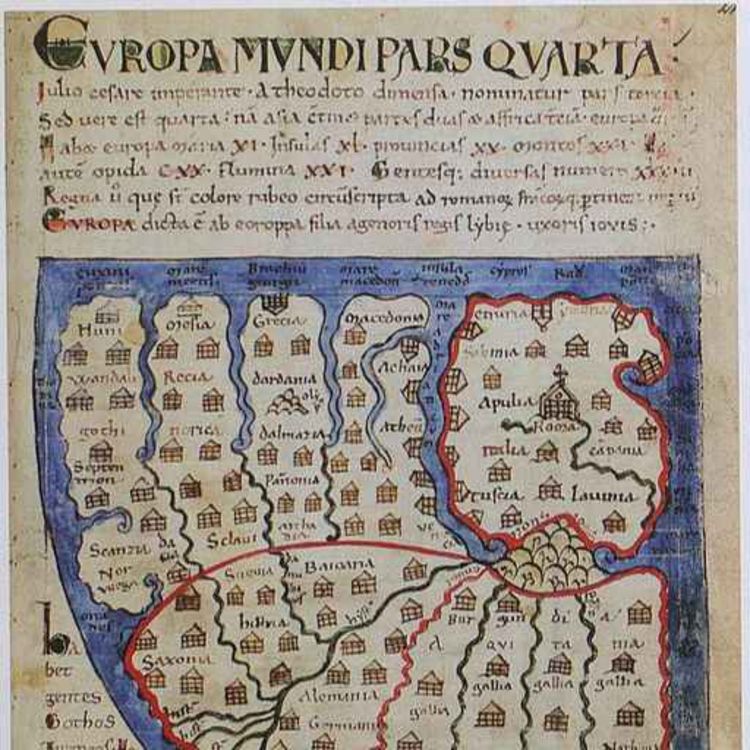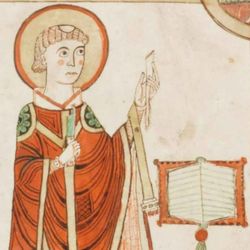Share

Europe in the 11th century
Episode 1: in conversation with RI Moore (UK)
Ep. 1
•
In this podcast, the first in the series, I discuss with Professor RI Moore his classic article, 'The Eleventh Century in Eurasian History: A Comparative Approach to the Convergence and Divergence of Medieval Civilizations’, Journal of Medieval and Early Modern Studies (2003) 33 (1): 1–21.
How has his thinking about the 11th century changed since 2003, and what does he still stand by?
Books mentioned in the conversation
- V.G.Childe, What Happened in History (1942)
- Johann Arnason and Bjorn Wittrock (eds,), Eurasian Transformations, Tenth - Thirteenth Centuries (2011)
Music: Karen Gomyo (CC BY-NC 3.0)
More episodes
View all episodes

12. Episode 12: medieval Europe in China, with Longguo Li and Yin Liu
40:39||Ep. 12In this episode, I’m joined by Longguo Li (Associate Professor at Peking University) and Yin Liu (Assistant Professor at Zhejiang University) to talk about how early medieval European history is studied in China today. We discuss Longguo’s recent article on medieval historiography, why historians in China are so interested in the Carolingian Empire, the translation of the Venerable Bede into Chinese, and the ‘Latin Revolution’ that’s taken place in China in recent years.Works mentioned in the podcast:Longguo Li, ‘“From “walking” to “sitting”: Changes in the practices of European historiography from ancient to medieval times’, Chinese Studies in History 53:2 (2020), 93-106Yin Liu, ‘Baptismal renunciation and the moral reform of Charlemagne's Christian empire’, Traditio vol. 76 (2021) p. 117-155Ernst Kantorowicz, The King's Two Bodies: A Study in Mediaeval Political Theology (1957)Music: Karen Gomyo (CC BY-NC 3.0)Image: the Venerable Bede at work https://www.e-codices.unifr.ch/de/bke/0047/1v
11. Episode 11: al-Andalus with Bruna Soravia (Italy)
20:44||Ep. 11How did government actually work in al-Andalus? In this episode, I discuss the kitaba, or 'art of the secretary', with Bruna Soravia. What did these secretaries (kuttab) do for rulers in eleventh-century Muslim Iberia? And how has the historiography of al-Andalus changed in recent years?Works mentioned in the podcast:Umberto Bongianino, The Manuscript Tradition of the Islamic West Maghribi Round Scripts and the Andalusi Identity, forthcomingUmberto Bongianino, "A Rediscovered Almoravid Qurʾān in the Bavarian State Library, Munich (Cod. arab. 4)", Journal of Islamic Manuscripts 11 (2020)Pierre Guichard and Bruna Soravia, Les royaumes de taifas: apogée culturel et déclin politique des émirats andalous du XIe siècle (2007)Bruna Soravia, 'Secretaries and the running of government', in The Routledge Handbook of Muslim Iberia, ed. Maribel Fierro (2020), pp 271-289Bruna Soravia, La maîtrise de l'art de la prose d'Ibn ʿAbd al-Gafūr al-Kalāʿī, forthcomingMusic: Karen Gomyo (CC BY-NC 3.0)Image: Munich BSB Cod. arab. 4, p. 13 (CC-BY-NC 4.0)
10. Episode 10: state formation in north-western Iberia with Alvaro Carvajal (Spain)
22:32||Ep. 10Northwestern Iberia is renowned amongst medievalists for its wealth of charters. In this episode, I talk to Alvaro Carvajal Castro about how historians are using these documents in concert with archaeology to investigate social and political changes in the 10th and 11th centuries, as kings and elites increasingly intruded upon long-established peasant communities.Works mentioned in the podcastCarvajal Castro, Alvaro, 'Early Medieval Commons? Or How the History of Early Medieval Europe Could Benefit from a Necessary Conversation: The Case From NW Iberia', International Journal of the Commons, 15(1) (2021), 338–353. DOI: http://doi.org/10.5334/ijc.1109Carvajal Castro, Álvaro and Tejerizo-García, Carlos (eds.), El Estado y la Alta Edad Media (Bilbao, Forthcoming).Davies, Wendy, Windows on Justice in Northern Iberia, 800-1000 (London, 2016)Escalona, Julio, and Iñaki Martín Viso. "The Life and Death of an Historiographical Folly: The Early Medieval Depopulation And Repopulation of the Duero Basin." In Beyond the Reconquista: New Directions in the History of Medieval Iberia (711–1085), edited by Simon Barton and Robert Portass, 21-51. Leiden: Brill, 2020.Quirós Castillo, Juan Antonio. "An Archaeology of “Small Worlds”: Social Inequality in Early Medieval Iberian Rural Communities." Journal of Medieval Iberian Studies 12, no. 1 (2020): 3-27.Music: Karen Gomyo (CC BY-NC 3.0)Image: Escorial Beatus, B_Escorial_a.jpg (1650×1928) (wikimedia.org)
9. Episode 9: monasticism with Steven Vanderputten (Belgium)
31:59||Ep. 9What does the eleventh century mean for monastic history? In this podcast, I'm joined by Professor Steven Vanderputten to talk about his latest research on monastic leadership and collaboration around the year 1000.Works mentioned in the podcast:Bruce, Scott and Vanderputten, Steven, eds., A Companion to the Abbey of Cluny in the Middle Ages (2022)Lawrence, C.H., Medieval Monasticism. Forms of religious life in Western Europe in the Middle Ages (London, 1989)Vanderputten, Steven, "'Columbanus wore a single cowl, not a double one": The "Vita deicoli" and the legacy of Columbanian monasticism at the turn of the first millenium', Traditio 76 (2021) p. 157-184Vanderputten, Steven, '"Against the Custom": Hagiographical Rewriting and Female Abbatial Leadership at Mid-Eleventh-Century Remiremont'; Journal of Medieval Monastic Studies 10 (2021), 41-66Vanderputten, Steven, Medieval monasticisms: forms and experiences of the monastic life in the Latin West (2020)Vanderputten, Steven, 'Pope Leo IX and the (Quasi-)Canonization of St Deodatus (1049). Hagiography, Papal Politics, and Local Competition at the Collegiate Chapter of Saint-Dié', Revue d’histoire ecclésiastique (2022), forthcomingVanderputten, Steven and De Gussem, Jeroen, 'Monachus ac Sacerdos Peregrinus: A Stylometric and Contextual Re-investigation of the Work of Theoderic of Fleury/Trier/Amorbach (fl. 970s–1020s)', forthcomingVanderputten, Steven, ed., Rethinking Reform in the High Middle Ages, 900-1150, forthcomingMusic: Karen Gomyo (CC BY-NC 3.0)Image: Bamberg SB MS Lit.142, fol. 65r
8. Episode 8: simony with Lioba Geis (Germany)
23:23||Ep. 8Simony (the illicit purchase of church office) was a major issue in 11th-century Europe. In this episode, I talk with Dr Lioba Geis about her "Habilitation" research into the nature and origins of simony, and what (if anything) changed in the 11th century.Reading mentioned in the podcast:Lioba Geis, 'The Battle Against Simony in Norman Italy. Perceptions, Interpretations, Measures and Consequences', in: J. H. Drell, P. Oldfield (ed), Rethinking Norman Italy. Studies in Honour of Graham A. Loud, Artes liberales (Manchester 2021), pp. 227-244.Lioba Geis, 'Kirchenrechtliche Norm und diözesane Praxis. Strategien des Umgangs mit Simonie im frühen 11. Jahrhundert, in: A. Bihrer, S. Bruhn (ed.), Jenseits des Königshofs. Bischöfe und ihre Diözesen im nachkarolingischen ostfränkisch-deutschen Reich (850-1100), Studien zur Germania Sacra. Neue Folge 10 (Berlin/Boston 2019), pp. 177-208Hans Meier-Welcker, 'Die Simonie im frühen Mittelalter. Begriff und Erscheinung in ihrer Entwicklung von der Spätantike bis zum Investiturstreit' in: Zeitschrift für Kirchengeschichte 64 (1952/53), 61-93Timothy Reuter, 'Gifts and simony', in Medieval transformations: texts, power and gifts in context (Leiden, 2001) p. 157-168Image: Paris BnF lat. 9448, fol. 54v https://gallica.bnf.fr/ark:/12148/btv1b84229915/f118.imageMusic: Karen Gomyo (CC BY-NC 3.0)
7. Episode 7: environmental history with Ellen Arnold (Norway)
25:09||Ep. 7What can we learn about perceptions of nature c. 1100 from the work of the canon Lambert of St-Omer? In this podcast I'm joined by the environmental historian Ellen Arnold (University of Stavanger, Norway) to discuss Lambert's great Liber Floridus.References to works mentioned in the podcastLambert of St-Omer's Liber Floridus Ghent University Library | Liber FloridusEllen Arnold, 'An Introduction to Medieval Environmental History', History Compass 6 (2008), 898-916 Ellen Arnold, Riverscapes Revisited: Environmental Meaning and Memory in Gaul, ca. 300-1100, forthcoming with Cambridge University PressAlbert Derolez, The Making and Meaning of the Liber Floridus. A Study of the Original Manuscript, Ghent, University Library, MS 92 (2015)Carlo Ginzburg, The Cheese and the Worms (1976)Music: Karen Gomyo (CC BY-NC 3.0)
6. Episode 6: 11th-c. Byzantium with Koray Durak (Turkey)
43:24||Ep. 6The 11th century is surely the most exciting of Byzantium's long history. In this podcast, I'm joined by Koray Durak, Associate Professor at Boğaziçi University in Istanbul, to discuss the Macedonian dynasty, international trade, the impact of the crusaders, and the image of Byzantium in modern Turkey.References mentioned in the podcast:K. Durak, 'The Representation of Byzantine History in High School Textbooks in Turkey', Byzantine and Modern Greek Studies, 38/2 (2014), 245-264.K. Durak, 'The commercial history of Trebizond and the region of Pontos from the seventh to the eleventh centuries: an international emporium', Mediterranean Historical Review 36 (2021), 3-41Music: Karen Gomyo (CC BY-NC 3.0)
5. Episode 5: liturgy and kingship with Pawel Figurski (Poland)
22:47||Ep. 5Did kingship become 'desacralised' during the 11th century in the Latin West? In this episode I discuss the changing liturgy of kingship with Pawel Figurski (Polish Academy of Sciences).References to works mentioned in the podcastP. Figurski, 'Das sakramentale Herrscherbild in der politischen Kultur des Frühmittelalters', Frühmittelalterliche Studien vol. 50 (2017) p. 129-162P. Figurski, J. Dale, P. Byttebier (eds.) Political Liturgies in the High Middle Ages. Beyond the Legacy of Ernst H. Kantorowicz, forthcomingP. Figurski, Dangerous Prayers. The Eucharistic Liturgies and the Forging of Sacramental Kingship in Europe (c.800–c.1200), in preparationE. Kantorowicz, Laudes Regiae: A Study in Liturgical Acclamations and Mediaeval Ruler Worship (1946)Image: Coronation of Henry II, WikipediaMusic: Karen Gomyo (CC BY-NC 3.0)
4. Episode 4 - 11th-c. Bohemia with David Kalhous (Czech Republic)
34:08||Ep. 4A conversation with David Kalhous (Brno) about the history of 11th-century Bohemia.Image: a coin of King Vladislaus II, depicting Wenceslaus and the Holy Lance (Berlin, SMB)Books mentioned in the podcast:Cosmas of Prague: The Chronicle of the Czechs ed. and tr. Janos Bak et al.David Kalhous, Anatomy of a duchy : the political and ecclesiastical structures of early Přemyslid Bohemia (2012)Lisa Wolverton, Cosmas of Prague: narrative, classicism, politics (2015)Music: Karen Gomyo (CC BY-NC 3.0)